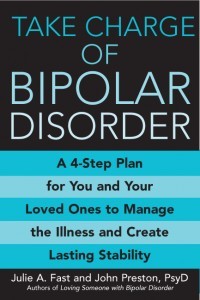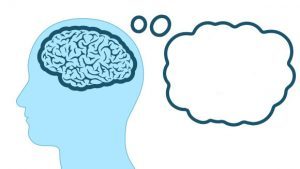Julie A. Fast's Blog, page 22
August 21, 2018
Manic Spending: More Money Saving Tips for People with Bipolar

When my mania has the upper hand and I’m itching to buy 1000 Sharpies or earrings and items I don’t need, I go cash only for awhile. This means taking the debit card out of my wallet and getting a wad of ones and using them to pay for purchases. Nothing calms me down more than counting out $29 in ones if I want to buy a new pen set. I will think before buying. If I’m manic and it’s a debit card, forget it. The money means nothing. Here is a note from a reader who tried this process.
Hi Julie,
I, too, have gone cash only; with the exception of a low limit credit card to purchase books online that can’t be purchased any other way.
I find that I don’t get the shopping rush if I JUST DON’T GO IN THE STORE. This is tough. I had to go to the store recently for some necessities with cash only. However, I spent all the cash. I felt great while I was putting things in the buggy and not so great when I reached in to buy lunch and didn’t have enough to eat. I suggest staying HOME. I really don’t NEED all that stuff, anyway.
All the commom sense things work when ‘well’. Eg. Meal planning for the week or month and going in with only that much cash. Repurposing household items, swapping clothes with a friend, swapping books, even furniture that you are tired of. It still feels new if your friend’s stuff is in your house! I do some couponing, but healthy eating coupons are hard to come by. Give gifts of my time instead of expensive presents. Plan ahead for errands and make one day to get it all done. Saves a lot on gas! Ask people to NOT give me gifts! That helps with the obligation aspect of things and saves a lot of money. Turn the thermostat up a few degrees in the summer and down a few degrees in the winter. For every degree you change, you save 10% of your bill! Be careful not to change it too much as even the furniture and walls heat and cool as well. If you change too much, you still end up using the same energy to re-heat and re-cool all that stuff. If you are really into saving money, UNPLUG all eletronics when not in use. It’s a pain to keep plugging all those things back in, but it can save you a ton of money. electronics have ‘power’ going to them even when they are OFF. TV’s, stereos, COMPUTERS, etc. Stop eating out. You would be surprised at how much you can save. When you can, buy store brands and generic brands of everything. I have also starting hanging my clothes on a backporch line. Saved me about $50.00 the first month. These are just some of the things I try to do.
Love,
Sarah
August 19, 2018
Do People with Bipolar Get Better?

In 2010, I was so suicidal I had 13 bilateral ECT treatments. They helped my psychosis enormously, but not the depression. In 2012, I was so suicidal, I had a bottle of pills in my hand and talked myself out of my room and into calling my coauthor John Preston for help. The suicidal episode was a reaction to a med change.
In 2016 in a beautiful room in Cannes, France I was suicidal from Ambien and had the thought I should jump out my window. Just two months ago, I was so suicidal and paranoid due to a new job, I had to stay home from a World Cup match. This is significant because I can honestly say that soccer is my love.
Please know that this illness might not ever end for some of us, but we can learn to manage this illness. I live with bipolar. I manage bipolar by using my Health Cards Treatment System for Bipolar. I want the same life for you. No gimmicks. I take meds, but I’m not drugged. Life is often hard, but unlike in the past, life is hard, but at the same time, it’s also good!
What can you do today to start getting better?
Who can you call?
What med can you try?
What book can you read?
I believe in you!
Julie
August 3, 2018
Bipolar and Overstimulated? Me too!

Signs I have overworked, am overestimated and that my #bipolar is raging. What on this list happens to you?
1. I get very testy and mean. People upset me and I’m a bitch in public.
2. I purse my lips and think that things should be different than they are.
3. I can’t sleep.
4. Traffic is simply impossible for me to deal with. I yell and shout while driving.
5. I feel guilty about my behavior.
6. I have trouble stopping. I will keep working out of guilt and the belief that I’m lazy.
This is when I have to take stock of my current situation and talk with myself about my choices. I literally say this to myself….
Julie, it’s great that you have work you love. Bipolar is here though and it means you have to slow down. Did you take your meds? (Yes) Ok, check that off the list. Are you going to get to bed at a reasonable time tonight? (I’m worried that I am going to work too late as I have an event to go to that starts at 9:30 PM) It’s ok. Go to the event and stay an hour. Go straight home, take your sleep meds and calm yourself down.
ETC.
Talking to yourself when you see the signs that you’re overstimulated is a wonderful tool. The Health Cards taught me my symptoms. Now, I have my lists of what to look for and I know what I need to do. I can’t stay at this level of mood. It’s not sustainable. I can take care of myself now. I don’t have to let it escalate. I can be a nicer person. I can calm down.
This is how I manage my bipolar. I’m interested in your story.
Julie
PS: I like this parrot picture- it’s me in animal form when I get overstimulated.
August 2, 2018
Robert Whittaker of the Polar Warriors on Youtube…
is having a give away!
As you might know, I love the work of Robert Whittaker. If I had 1/10th of his video talent, I’d be happy. Check out his latest video and enter in his contest to win books and other fun items including BP Magazine for Bipolar copies. (A magazine you know I love.)
Please click on this link and sign up for his Polar Warriors Youtube Channel and help spread the word about his truly amazing #bipolar videos. Robert has 23k subscribers on his channel. Let’s take him to 25k!!
I can tell you that this man has been an unwavering supporter of my work for a very long time and I hope we can support him as he continues to make some of the best #bipolar content on Youtube.
Robert works with the International Bipolar Foundation and the bp Magazine Bipolar Disorder Support Group. I love it that we can all work together to get the word out that bipolar disorder can be managed.
Julie
July 31, 2018
How to Stay Stable when Life is Going Well

Life with bipolar disorder is up and down. When I am down, I know what to do. When I am up, I know what to do. My goal is to stay in the middle. Last night, I got some really exciting news about work. It was around 9:30 PM. I immediately went up. I didn’t want to.
I wanted to just take in the information and go to sleep.
Bipolar doesn’t allow this. I had an instant cascade of ideas. I wanted to get started on the project immediately.
I was not #manic when I heard the news. Within a few minutes, I started to get manic. This may seem impossible to those who are not familiar with my type of rapid cycling bipolar, but I really am this sensitive in both directions. I live on a balance board. I need to think about bipolar every minute of the day.
What did I do to calm down?
I immediately took my lithium orotate. I then took my sleep meds and added an extra dose of one of the meds. I forced myself to close my computer. I got in my room, turned off the lights and listened to a calming podcast. I did manage to sleep. These meds make me fat and hungry.
It’s not fair. Nothing about this is fair.
This morning I woke up in an down swing. I had the thought, ‘What is the point of work anyway? Why get excited about something that has no meaning?”
Bipolar is BS. That is the truth.
My goal today is to stay in the middle.
Julie
July 27, 2018
What is Bipolar Disorder?

What is Bipolar Disorder?
Bipolar disorder is an illness that appears very, very confusing when you have just been diagnosed or if someone you love has a possible or official diagnosis.
Here is some great news. The illness is NOT difficult to understand once you know the basics.
The following is an excerpt from my book Take Charge of Bipolar Disorder: A 4-Step Plan for You and Your Loved Ones to Manage the Illness and Create Lasting Stability.
I’ve written books on the topic of bipolar disorder for over ten years since my partner of 10 years was diagnosed in 1994 and I was diagnosed in 1995.
Take Charge of Bipolar Disorder is the book I recommend for learning the basics of the illness, especially if you have just been diagnosed. It’s great for family members, partners and health care professionals as well.
The following is a technical explanation of bipolar disorder from the introduction to Take Charge of Bipolar Disorder.
An Explanation of Bipolar Disorder
Bipolar disorder is a mood disorder. Mood disorders include bipolar disorder and depression. Although symptoms can overlap with those of other mental illnesses, mood disorders are different, for example from schizophrenia, which is a psychotic disorder and borderline personality disorder, which is a personality disorder. If you give people an explanation of bipolar disorder, you can tell them that it’s a mood disorder that affects the chemicals in your brain and causes change in moods that are often not normal responses to outside events. More technically, bipolar disorder is a genetically transmitted medical illness that affects brain chemistry. It results in abnormal regulation of never cells that are responsible for emotional regulation. This abnormality in brain chemistry leads to difficulties in controlling strong emotions and periodically causes intense episodes of either mania or depression as well as a wide variety of other symptoms including anxiety, ADHD symptoms, psychosis and sleep disturbances.
**
And now for a basic explanation of the symptoms of the illness:
Bipolar I (one) and Bipolar II (two).
There are two main types of bipolar disorder: Bipolar disorder I (one) and bipolar disorder II (two). The main difference between the two is the type of mania a person experiences.
It is very important to note that mania must be present at some point before a person can be diagnosed with bipolar disorder. There are not exceptions.
Bipolar I has full blown mania. Bipolar II has hypomania.
If you have a diagnosis, you need to know what type of the illness you have as the medications used are quite different.
What is Rapid Cycling?
Though the symptoms of the illness (described below) stay the same, the frequency and duration of mood swings differs greatly in people with the illness. A person has rapid cycling if they have three or more mood swings a year. Some people with the illness, like myself can have dozens or more mood swings a day. Research shows that 20% of people with the illness has rapid cycling. In my experience, I feel the numbers are much higher.
There are two main mood swings in bipolar disorder: depression and mania. Here are more excerpts from Take Charge of Bipolar Disorder:
What is Bipolar Depression? ‘
Depression is much more than sadness and unhappiness. .. Most people with bipolar depression have dozens of symptoms of depression. Here are just a few symptoms of bipolar disorder. Check the ones that you (or your loved one) experiences:
Sadness, unhappiness, feelings of despair and hopelessness.
Irritability, frustration, low tolerance and anger.
Low self esteem, feeling worthless or inadequate, loss of self confidence.
Negative, pessimistic thinking. A bleak view of yourself, current life circumstances, and the future.
Suicidal thoughts.
Poor memory and concentration.
Neediness.
Anxiety. (90% of people with bipolar depression have anxiety.)
Feeling easily overwhelmed.
Sleep changes from either sleeping too much or agitated sleep.
Being overly emotional, crying easily or getting angry easily.
Brain racing and looping, one thought or a group of thoughts that keep going through your mind over and over again.
(There is a more comprehensive list of bipolar depression symptoms in Take Charge of Bipolar Disorder.)
What is Mania?
Full blown mania and hypomania share most of the symptoms below- but in differing degrees. One other difference is that those with full blown mania have a high incidence of psychosis when there is a strong manic episode.
Mania is a chemically elevated mood that can be either euphoric or dysphoric (also called expansive mania, agitated mania or mixed mania). Full blown mania often leads to severe social impairment and occupational dysfunctioning and usually requires hostpitalization.
Hypomania is also described as an abnormal or persistently elevated, expansive or irritable mood. (This is the dysphoric mania.) Hypomanic mania if often of a short duration, but can last for months. The difference is that although mania and hypomania have an identical list of characteristic symptoms (with psychosis being the exception), the disturbance caused by hypomania is not usually severe enough to result in marked impairment in social or occupational functioning or to require hospitalization. Though there are exceptions, especially with euphoric mania.
Manic and hypomanic episodes often begin suddenly, with a rapid escalations of symptoms over a few days.
The following lists a few symptoms of bipolar mania. Take Charge has a very comprehensive list:
Euphoric mania:
Feeling great no matter what happens.
A profound feeling of physical well being.
Increased self esteem or grandiosity. ( This can be with psychotic mania as well.)
Decreased need for sleep without being tired the next days. For some this is sleeping 4-5 hours a night, for others it’s not sleeping at all.
Talkativeness and rapid speech. Pressured speech where you can’t let others talk.
Dysphoric (agitated) Mania:
Hyperactivity, restlessness or agitation.
Both euphoric and dysphoric mania:
Talkativeness and rapid speech. Pressured speech where you can’t let others talk.
Increased use of alcohol and drugs. Eating usually decreases.
Increased sexual desire.
Poor judgment and engaging in high-risk behaviors: reckless driving, excessive spending sprees, gambling, giving away large sums of money.
Inability to see that you’re ill.
**
Mania can be ignited by the use of antidepressants, stimulants (ADHD medications) light therapy and drugs such as steroids (cortisol, etc.) Anti depressants and stimulants can be used along with a mood stabilizer, but they have to be carefully monitored for mania symptoms.
Other Symptoms of Bipolar Disorder
The final symptoms of bipolar disorder include psychosis, anxiety and irritated, anger aggression and violent behavior. These symptoms can lead to paranoia, OCD and cognitive problems such as those found in ADHD. Take Charge of Bipolar Disorder has an extensive list of these symptoms. Bipolar disorder is not just mania and depression, so a knowledge of the above symptoms is essential.
The Good News
When symptoms of bipolar disorder appear to be random and chaotic, with no apparent rhyme or reason, it’s easy to feel overwhelmed. It’s important that you understand all of the possible symptoms of bipolar disorder and come to see them as common and even predictable manifestations of bipolar disorder. Not only can this take the mystery out of the experience of bipolar disorder episodes, but it can also help you communicate clearly to your health care professional when particular symptoms emerge. Finally, knowing the nature of these symptoms is also a necessary starting point for developing a rational treatment plan.
(A side note. If you care about someone with the illness and they are in denial, can’t see they are ill or are hospitalized at this time, learning all you can about the illness will give you the information needed to recognize bipolar symptoms so that you can help a loved one get into treatment.)
Knowledge Matters
Learning about bipolar disorder puts you in control and helps you become a participant in your own healing, instead of just a spectator to the professionals who manage your medications. Knowledge really is power. The more you know, the more likely you are to remind yourself that this is just an illness that needs management, instead of feeling that it’s some personal failing on your part because your emotions go all over the place.
*end excerpt*
Take Charge of Bipolar Disorder is such a wonderful book for learning the basics of the illness and how it can be successfully treated and managed.
If you’re overwhelmed, Take Charge of Bipolar Disorder will answer the basic questions about bipolar disorder symptoms, the medications used to treat the illness and how to successful manage this illness in all areas of life.
Take Charge of Bipolar Disorder is available on amazon.com (where is has been one of the top books on bipolar disorder for over five years. Here is a link to the book on amazon.com:
Take Charge of Bipolar Disorder on amazon.com
It is also available in my treatment system for bipolar disorder from the following link. If you scroll down to the bottom of the page, you will see the books in the package.
Julie’s treatment system package
We can all get better and family members, partners, friends and health care professionals can learn to help.
Julie
?
July 24, 2018
Demi Lovato and Bipolar

Demi Lovato is not a role model for people with bipolar. Please do not see her current situation as your path. My heart goes out to her as a person. As a person with bipolar, I have watched her live a life for many years that would have killed me long time ago. I have never spoken about this out of respect for her as a person. I said it many times to people who used her to promote mental health. Now, I want to remind everyone that celebrities who talk about mental health are not our guides. They are simply famous. They are not role models. If you have bipolar, her behavior is not what happens to people with bipolar who manage the illness. Please do not take this personally as something that might happen to you.
She is a human being. All human beings have problems. These problems are not always about bipolar.
Julie
July 21, 2018
Bipolar Disorder and Making Money by Saving Money
How about that picture from the past! Woo!
I know that many people with bipolar disorder- myself included- have challenges with money. It’s not always easy to work steadily when you have mood swings.
I heard a advertisement on the radio this morning that really, really made sense. It said,
Saving Money is the Same Thing as Making Money
Agreed. Every bill that is paid on time is saving money because it saves a late fees.
Every cell phone plan that is watched carefully for mistakes and unknown charges saves money.
Always check to see if you have said yes to a ‘free month’ of a subscription service and then forgot to cancel. Amazon.com is notorious for getting people to sign up for ‘free’ previews that we then forget to cancel.
In other words, if we do things that cost us money for no reason- we lose money. This is the same as working for nothing.
I like the idea of saving money by being smart with our money. And most of all…. check your cable bill if you have one! They are notorious for hidden and added fees.
Julie
Julie
July 20, 2018
Julie, How Much Should I Share About My Bipolar on Facebook?

Advice on sharing mental health experiences on Facebook. First, thank you for all of the questions I receive. I still have not found the perfect way to answer them all, but I can let you know I try to write as many blogs that cover the most commonly asked questions. I will do another FB Q&A soon. Here is one I get a lot:
Julie, how do you feel about sharing your mental health history on Facebook when you know that people you work with will see your posts?
Here is how I balance honesty without creating a situation where someone might have concerns about working with me.
1. I post after I have experienced a tough mood swing. I do not post in the middle. This is when I can be too emotional and when my posts might be unreasonable. What does this mean? It means that depression or mania are my constant companions, but my posts are usually a few days past the experience. If you see me writing about a specific symptom, please know it is not full blown when you read about it. I am in the process of getting better and no one has to worry about me. I stay away from Facebook if I am really sick. I have family, friends and a health care team for support.
2. I ALWAYS post what I am doing to get better. This is part of my management plan. Helping others helps me stay stable.
3. I never and I do mean never share the names of anyone I work with, talk to or care about who have hurt me. I do not do this passive aggressively either where I say something that is cryptic – nor do I humiliate or go after someone publicly who steals from me.
4. Everyone knows I have bipolar disorder because I am not embarrassed about having bipolar disorder. It is my job to never let my illness get in the way of my work. This is not always possible. Those who work closely with me have seen me fall apart many times, but people will never see this online.
5. Social media is permanent. I work with many organizations who absolutely DO look at what a potential collaborator or employee posts on Facebook. What you write affects who hires you.
Even if you have an account set to private or feel you are safe on a group that is closed, you are not. Everything you write can be seen. If work is important to you…if you want future friends and family members to see the reality of your life, it is fine to be honest, but if you want to be a professional writer, speaker, coach or hold any position that is in the public eye, people definitely look to Facebook to see what is going on in your private life. I believe that being honest while at the same time talking about what you are doing to get better is the answer.
Julie
July 18, 2018
Bipolar Disorder and Brain Scans

It’s time to get clear on what we really know about brain scans and #bipolar. It’s so frustrating to read articles and studies about bipolar and brain imaging. At this time, there is NO brain image scan for the diagnosis of bipolar. Please do not pay someone who tells you that they can determine bipolar from an MRI or PET scan. It simply isn’t true.
This is nascent science. One study shows some grey matter thinning in 3000 patients, another shows ‘abnormal’ activity in the amygdala and frontal lobes. There is nothing definitive and even if someone did find a change in the brain, without having a management plan that works, the information is just that.. information.
Please remember that depression and bipolar disorder are mood disorders, but they are vastly different in presentation and treatment.
If you have mania, you have bipolar. You don’t need to pay for a brain scan to know if you have bipolar disorder. Spend your money on effective treatment, good therapy and feeling better.
Find a management plan that works for you. Use Take Charge of Bipolar Disorder or the WRAP program or any program that helps with mood swings. This is how you can successfully manage bipolar disorder.
Julie
Julie A. Fast's Blog
- Julie A. Fast's profile
- 67 followers




